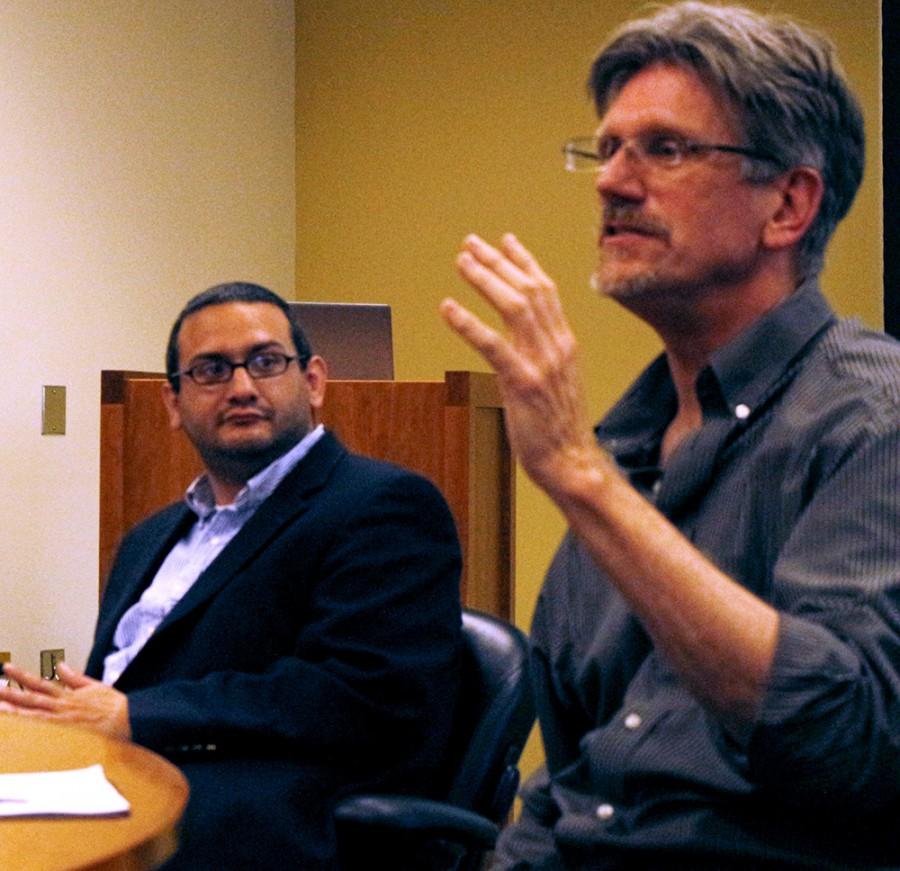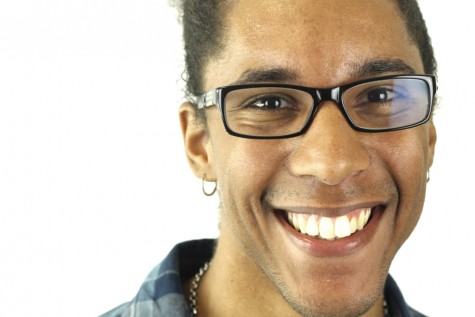Professors attempt to make sense of the Islamic State
History professor Brian Mann (Left) listens to fellow panelist Newton Key, also a history professor, as he discusses the importance of geography in relation to ISIS Tuesday in the Booth Library conference room.
April 14, 2015
Professors ranging in career fields from history to biology debated and discussed their attempt at “Making sense of the so-called Islamic State” Tuesday evening.
Brian Mann, a history professor, said Americans have a lot of confusion between Al Qaeda, ISIS and the Islamic State. Mann said just because ISIS calls itself the Islamic State and they use the same scriptures does not mean the group is mutually exclusive with Islam.
He said ISIS is a relatively small group of 1.6 billion people, and each are from different nations, speak different languages and are generally diverse.
“Isis is just a small group that gets a lot of play,” Mann said.
Mann said one of the differences between the Al Qaeda and ISIS is that Al Qaeda wanted to overthrow all regimes Bin Laden viewed as un-Islamic under the control of Western powers.
“If you can inspire people to revolt and eventually through waging wars you overthrow these leaders, eventually you’ll get to a caliphate,” Mann said
A caliphate is when the religion and political structure of the state are the same, for example, if the Pope was the political leader and religious leader of Europe. Mann said it is having no separation of church and state, as opposed to the United States.
He said Al Qaeda had issues with the regimes the U.S. supported, so the group wanted to do as many attacks as possible to put pressure on the U.S. to withdraw from the Islamic world.
By doing this, Al Qaeda wanted to overthrow governments and unite into a caliphate.
Mann said the idea with ISIS is immediacy — have a caliphate now, commit as much violence as possible to draw more individuals in, and then start recruiting people once it is established.
“They’re not seeking to attack on American soil; I’m sure they would love it, but it’s not what they’re looking for now,” Mann said.
Hasan Mavi, a kinesiology and sports studies professor, said ISIS has nothing to do with Islam. Mavi, who is Muslim, would consider those in ISIS to be “modern pirates.”
Mavi said the reason the U.S. or any other developed country does not have terrorist groups like ISIS is because of the economic and social stability. He said the justice and government system works and young people have hope in terms of education and job future.
“Their generation, they’ve never seen a peaceful day in their lives,” Mavi said.
Mavi said when it comes to ISIS, those who benefit from it are those who want to destroy the image of Islam, the oil markets, those in “war business” and privileged people. However, those who suffer are the poor, historical artifacts and most of the world, he said.
Mavi said every $1 billion spent on defense creates 8,555 jobs and adds $565 million to the economy.
“They live ‘out there’ in terms of their ideology,” Mavi said.
However, ISIS still has had many young people attempting to join their cause, which was a hard question for the panelists to answer.
Newton Key, a history professor, said those who want to join ISIS see it as a revolution, and they want to join something that is a complete change. Key said it is not one group involved with ISIS; it is multiple, and the Islamic State is getting support from a lot of different groups.
Roberto Hodge can be reached at 581-2812 or [email protected].


















































